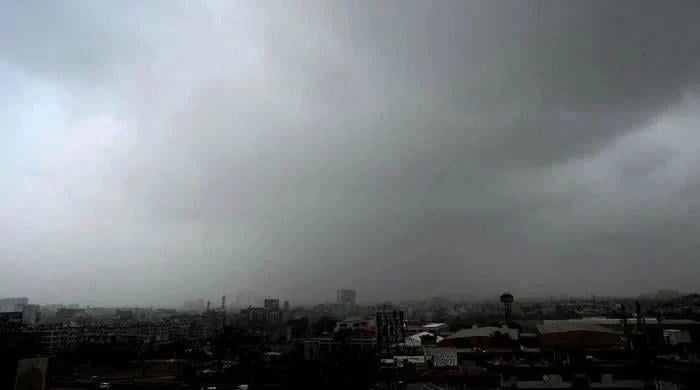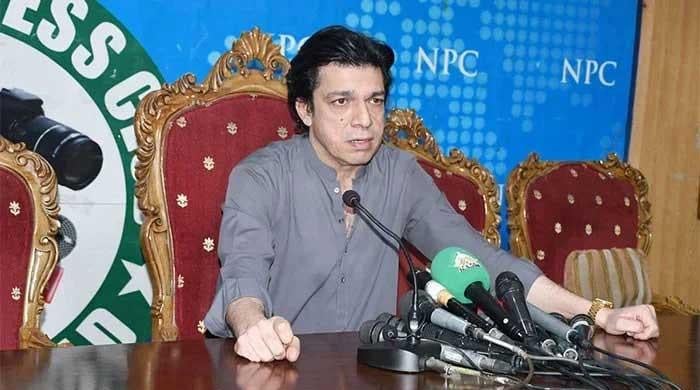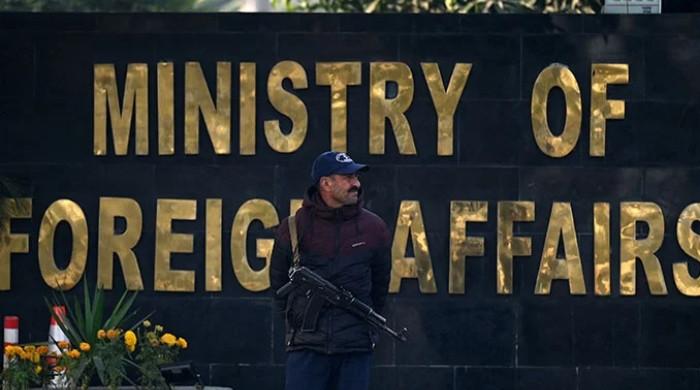Govt clarifies Sanaullah's statement on filing reference against two SC judges
Rana Sanaullah never talked about filing reference against judges, says Law Minister Azam Nazeer Tarar
February 13, 2025

- Govt to apprise media if decision taken on reference: Tarar.
- "CJP met IMF delegation as head of Pakistan's judiciary."
- Opposition, judges object to JCP's decision on judges elevation.
Federal Minister for Law and Justice Azam Nazeer Tarar clarified on Thursday that the premier's aide, Rana Sanaullah, never talked about filing a reference against Supreme Court judges except for presenting his point of view regarding "misconduct" by some of the judges amid growing tensions over the nomination and transfer of senior jurists.
Sanaullah, the prime minister's adviser on political and public affairs, hinted at filing a reference against two senior apex court judges two days ago, who were committing "misconduct" by "writing letters on every issue containing critical remarks" and "leaking it to the media".
However, the premier's adviser clarified his statement yesterday while speaking on Geo News' programme 'Aaj Shahzeb Khanzada Kay Sath', saying that his remarks of filing a reference against the judges were neither an announcement nor a threat.
His remarks came amid strong opposition over the nomination of six judges to the Supreme Court by the Judicial Commission of Pakistan (JCP) meeting, which was boycotted by the Pakistan Tehreek-e-Insaf (PTI) lawmakers and two senior SC judges. The chief justices of all high courts, except the Lahore High Court (LHC) were among the six judges nominated.
A day ago, the law ministry also notified the appointment of six judges who were elevated to the Supreme Court from various high courts following President Asif Ali Zaradri's approval.
When questioned about a potential reference against SC judges today, Tarar told journalists at the parliament that the government has not given any statement about such a move and it would apprise the media if it takes any decision.
"Chief Justice [Yahya Afridi] is also head of the Law and Justice Commission of Pakistan," said the law minister, "[…] and also heads the rule of law programme." He added that Pakistani jurists used to attend different connections in this regard.
The JCP had approved the said judges' appointment to the apex court on February 10 during a meeting boycotted by PTI's Barrister Gohar Ali Khan and Senator Ali Zafar, and two SC judges, Justice Mansoor Ali Shah and Justice Munib Akhtar.
The judges' elevation issue was not left without controversy as four SC judges including Justice Shah, Justice Akhtar, Justice Ayesha A Malik and Justice Athar Minallah had written to the CJP Afridi urging him to postpone the JCP meeting "till the challenge to the 26th Constitutional Amendment is decided one way or the other".
However, apart from notifying the six SC judges, the government also issued the notification of the appointment of IHC's Justice Miangul Hassan Aurangzeb as the SC acting judge in light of the JCP's decision earlier this week.
Whereas Justice Sarfraz Dogar — transferred from LHC — has also been notified as the acting chief justice of the same court with effect from the date he takes oath of his office, till the appointment of a regular chief justice.
Justice's Dogar's transfer and subsequent change in the seniority list of the IHC itself is not without controversy as seven IHC judges — Justice Mohsin Akhtar Kayani, Justice Tariq Mehmood Jahangiri, Babar Sattar, Sardar Ejaz Ishaq Khan, Arbab Muhammad Tahir, Saman Rafat Imtiaz and Miangul Hassan Aurangzeb — had written to the CJP as well as high courts' chief justices against it.
CJP-IMF meeting
To another question, Tarar replied that CJP Afridi did not meet the International Monetary Fund (IMF) delegation in connection with any case but as the head of the Pakistani judiciary.
An IMF delegation visiting Pakistan to review the judicial framework as part of the ongoing $7 billion Extended Fund Facility (EFF) met CJP Afridi.
According to a press release issued by the Supreme Court, the chief justice provided an overview of "the ongoing efforts to enhance judicial performance".
Meanwhile, the IMF delegation acknowledged the judiciary’s role in maintaining legal and institutional stability and expressed its appreciation for ongoing reforms aimed at strengthening governance and accountability.









